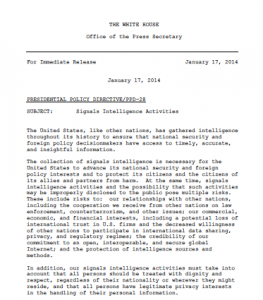Today, President Obama introduced the changes he ordered with today’s Presidential Policy Directive (PPD-28) to overhaul the controversial intelligence collection programs of the National Security Agency (NSA).
In the context of the challenges that technology poses to the Intelligence Community in accommodating privacy and security, the Chief Executive looked back at actions already taken in response to the Snowden revelations. These included
- the declassification and publishing of Foreign Intelligence Surveillance Court (FISC) opinions and documents related to the programs under public scrutiny
- the establishment of the President’s Review Group on Intelligence and Communication Technologies
- exchanges with the Privacy and Civil Liberties Oversight Board, foreign partners, representatives of the private sector, and academia
and informed the President’s intended overhaul of current signal intelligence (SIGINT) collection programs. He ordered an initial set of changes to be implemented:
- the strengthening of “executive branch oversight” of domestic and foreign intelligence activities, including the review of “decisions about intelligence priorities and sensitive targets on an annual basis so that our actions are regularly scrutinized by my senior national security team”
- the obligation of the director of national intelligence (DNI), in consultation with the attorney general (AG), to review “for the purpose of declassification any future opinions of the court with broad privacy implications” on an annual basis, and to report respectively to the President and to Congress
- the proposition to establish a Congress-authorized “panel of advocates from outside government to provide an independent voice in significant cases” before the FISC
- the call to DNI and AG for additional restrictions on the government’s “ability to retain, search and use in criminal cases communications between Americans and foreign citizens incidentally collected under Section 702” of the Foreign Intelligence Surveillance Act (FISA)
- the amendment of the regulations on the use of national security letters with a view to increase transparency, and the enabling of communications providers “to make public more information than ever before about the orders that they have received to provide data to the government”
- the two-step transition of the bulk metadata collection under Section 215 of the PATRIOT Act into a “a mechanism that preserves the capabilities we need without the government holding this bulk metadata”:
- effective immediately, step 1 includes a) the surveillance of phone calls that are two steps removed from a number associated with a terrorist organization, instead of three, as currently conducted, and b) database queries only based on a “judicial finding or in the case of a true emergency”
- step 2, the development of alternative options to implement Section 215 of the PATRIOT Act without the government holding the metadata itself by intelligence committee and AG before the program’s reauthorization on March 28th, 2014
The President’s reform list may be longer and contain more tangible changes than expected by skeptics. Yet, although he introduced the reforms with the intention to adopt them administratively or codified by Congress, only the third party panel for significant FISC cases (point 3.) addresses Congressional authorization directly.
Effective checks and balances require to be established across governmental branches in order to cover the full range of intelligence activities authorized by the Chief Executive, whose PPD-28 on signal intelligence activities of today displays the power he holds:
The collection of signal intelligence shall be authorized by statute or Executive Order, proclamation or other Presidential directive, and undertaken in accordance with the Constitution and applicable statutes, Executive Orders, proclamations, and Presidential directives.
(section 1 a)
Now that the executive branch has implemented reforms, it is Congress’s turn.





2 Pingbacks